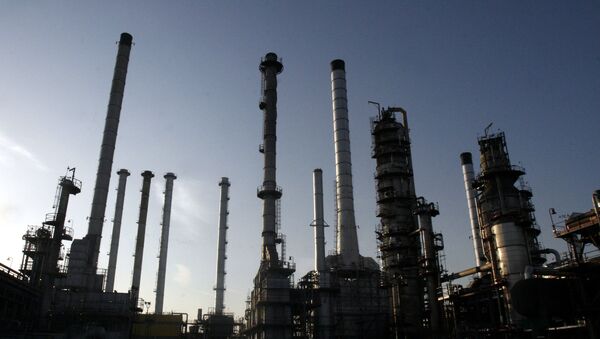The alleged CIA spy ring that Iran claims to have dismantled in June was trying to gather intelligence on the Islamic Republic's oil sales, The New York Times reported, citing unnamed traders.
According to the media outlet, many of the 17 people accused of spying for the US Central Intelligence Agency had allegedly worked in the oil and energy sector as traders and brokers.
These suspects reportedly came under scrutiny due to their contacts with foreigners during their trips abroad.
The NYT cited unnamed oil traders as claiming that the foreigners, who supposedly work on behalf of the United States, went as far as to offer enormous sums, from $100,000 to $1 million, just to find out the bank account numbers the Iranian Oil Ministry would use in a sale. One source alleged that some of the foreigners promised visas to the United States for the information.
Per the newspaper, information about Tehran's crude sales and production is a "crucial tool" for the United States to step up its "maximum pressure" campaign against Iran.
Secretary of Iran's Supreme National Security Council Ali Shamkhani announced on 17 June that the country had allegedly busted a CIA-run "large US cyber-espionage" network with help from the intelligence services of other countries. The country's judiciary later stated that Iranian military personnel working for US intelligence would be executed for treason, while non-military personnel would serve long prison terms.
A month later, Iranian media claimed that as many as 17 CIA-trained spies had been identified, and published photo and video evidence of purported US attempts to recruit Iranians to work against their government.
At the time, US President Donald Trump took to Twitter to slam the reports as "totally false", while adding that there was "zero truth" in those allegations.
The Report of Iran capturing CIA spies is totally false. Zero truth. Just more lies and propaganda (like their shot down drone) put out by a Religious Regime that is Badly Failing and has no idea what to do. Their Economy is dead, and will get much worse. Iran is a total mess!
— Donald J. Trump (@realDonaldTrump) July 22, 2019
His tweet echoed earlier comments by US Secretary of State Mike Pompeo, who argued that "the Iranian regime has a long story of lying".
Tensions have been simmering in the region since the US withdrew from the Joint Comprehensive Plan of Action, also known as the 2015 Iran nuclear deal, in May 2018, and decided to reinstate all sanctions against the Islamic Republic.
Having decided to reimpose all sanctions and introduce a new set of restrictions on Iran's energy, shipping, financial, and other sectors, President Trump pledged to cut the country's oil exports to zero. He also vowed to introduce secondary sanctions on foreign companies doing business with Tehran, which drew much criticism from other signatories to the nuclear deal.
Washington, however, provided waivers to eight economies, China, India, Japan, South Korea, Italy, Greece, Turkey, and Taiwan, who agreed to reduce their purchases of Iranian oil, allowing them to continue buying it without facing sanctions for six more months. In April, the Trump administration decided not to reissue waivers on Iranian oil after they expired in May 2019.
On the one-year anniversary of the US unilateral pull-out, Tehran announced that it would partially suspend some of its voluntary commitments under the nuclear deal, having set a 60-day deadline for the five remaining signatories to the agreement - Russia, China, the UK, France, and Germany - to ensure that its interests are protected or else the country would resume enriching uranium at higher levels.
As the deadline expired, Iran stated that it would begin enriching uranium beyond the 3.67 percent level set by the accord and warned that it would gradually abandon its nuclear obligations every 60 days.




